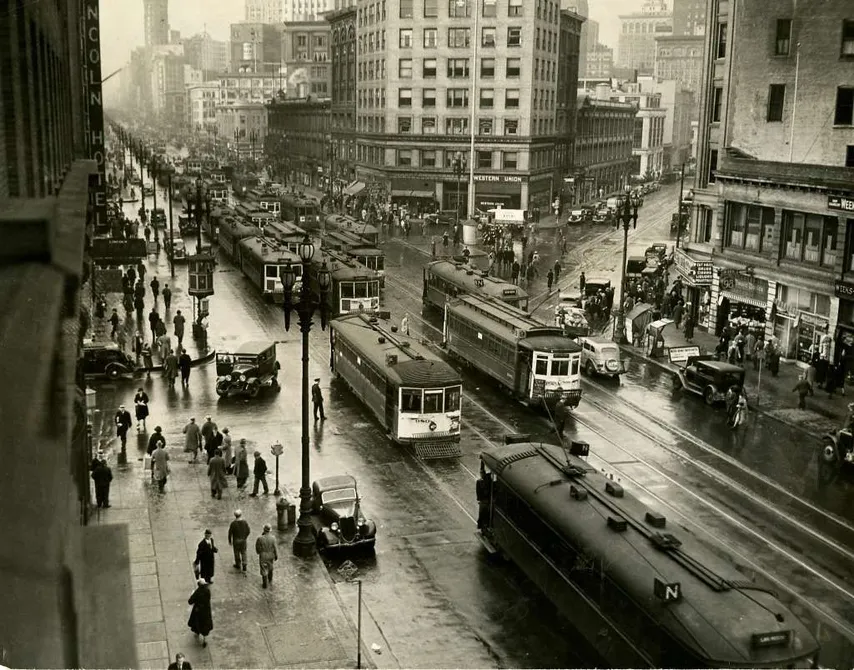For this poker cheating story, we're going back over 80 years. More specifically, to San Francisco, California in the 1940s.
The case of People v. Solano revolves around the criminal charges against Tony Solano for grand theft. Two counts, in fact. The prosecution presented a compelling narrative that depicted Solano as the orchestrator of a scheme to rig poker games.
However, these games weren't rigged in a standard way, and there was a twist. You see, in Tony Solano's plot, his accomplices became the victims.

The Charges Against Tony Solano
Tony Solano faced two counts of grand theft, with allegations stemming from two separate incidents. The California Court of Appeals combined both victim's charges into one case in 1941.
In the first incident, he allegedly took $700 from Frederico Francisco on March 20, 1939. Solano and Francisco split a room at the Hansa Hotel, a location that seems to be lost to the sands of time. Solano offered to give Francisco $25 for the game of draw poker. The match happened around 10 months before the second incident.
In the second incident, Solano was accused of stealing $1,500 from C. M. T. Carvajal on December 28, 1940. Apparently, he loaned Carvajal $30 for the game in the Rite Hotel, another location that either closed down or rebranded.
In both games, Solano acted as a host and gamesmaster. Allegedly, he offered to signal to Francisco and Carvajal, giving them a guaranteed win in a supposedly lucrative game. However, the outcome would not be what his unwitting accomplices expected.
The victims are also the accomplices in this ancient poker cheating case, which happened 60 years before the first real money online poker site. Francisco and Carvajal had planned to dupe other players, assisted by signals, but they wound up on the scam's receiving end.

Testimony from the First Witness: Frederico Francisco
Frederico Francisco testified about his initial meeting with Solano in March 1939, where he was introduced to poker under the guise of a friendly game.
At Kearny and Jackson Street, Solano and Francisco met for the first time. Apparently, the two got along well enough for Francisco to give up his address. Later on, Solano showed up at his door holding a deck of cards. Francisco said he didn't know how to play cards, but Solano taught him the rules of draw poker. His newly found poker coach told him that with $25, they could play against a whale and win some money.
At this time, Solano demonstrated the signals he would give Francisco during the game. The method wasn't complicated; Tony Solano would simply stand behind Francisco's opponent and motion with his hands.
- A single finger meant one pair.
- Two fingers meant two pairs.
- Three fingers meant three of a kind.
- A closed fist meant a full hand.
The two traveled to the Hansa Hotel, where they planned to meet the other poker player. Once they arrived, a room was booked and split equally, right before Chinn showed up. The new player, apparently Chinese, produced his own deck of cards. Poker chips also materialized, though Francisco wasn't sure where from.

Solano and Francisco had been playing before Chinn arrived, but the new player was given a seat, as planned. Solano took his spot behind Chinn, also according to the plan. From time to time, he'd make signals to Francisco, who quickly turned the $25 into $500. Remember, this is over 80 years ago, and $500 is equal to over $11,000 today. After busting, Chinn said he'd go and cash a $2,500 check, as you did in the 1930s.
About half an hour after his return, Chinn told Francisco during a hand, "...if you have got any money all right, if you don't call this pot you lose all the money on the table." Francisco was working with extra information, so this wouldn't usually be an issue, but there hadn't been a signal yet.
But then, Solano told him, "If you have money in the bank, go get it and call the pot or else you will lose all. Go ahead and call him." We don't know the stack sizes, but this is a bizarre situation for a poker player to be in. Bets are always equally matched, 1 for 1, but that isn't what Francisco was being offered. From the quoted statements, it appears he had two choices:
- Call without knowing Chinn's hand strength.
- Fold and lose his entire chip stack.
Francisco was persuaded by Solano to withdraw $700 from his bank account. The two went to the bank branch together, taking both hands with them – Francisco's and Chinn's. Once they were away from the room, Solano showed Francisco that his opponent had . Unfortunately, this combo was stronger than Francisco's, who held . But remember, Francisco declared that he didn't know how to play cards. By this point, his only knowledge came from Solano's teaching, who had said to "Go ahead and call him."
Judging by the fact that Francisco bet $700 after seeing Chinn's stronger hand, Solano hadn't been clear enough. It must have been a surprising showdown for someone who thought their outcome was guaranteed. Ultimately, Francisco lost all his money, totaling $700. This might not sound like much to you, but accounting for inflation, $700 in 1939 is equal to around $16,000 in today's money.
Testimony from the Second Witness: C. M. T. Carvajal
The next witness, C. M. T. Carvajal gave the court a very similar testimony. On December 27, 1940, he lost $1,500 in a poker game arranged by Solano at the Rite Hotel. Carvajal described how Solano acted as the banker and provided signals during the game that misled him into believing he had a chance to win against another player who was also part of the scheme.
To start the game, Solano loaned Carvajal $30, equal to around $675 in today's money. Just as he had with Frederico Francisco, Solano promised to make signals. Another player from China named Lee arrived and bought in for $5,000 – far more than Carvajal's buy-in. This was probably a technique Solano employed like a carrot on a stick to entice Carvajal. Also, the court document makes no mention as to whether or not Lee and Chinn are the same person, only mentioning first names for both characters.
After some time, Carvajal was "induced" to withdraw $1,500 from his bank (worth around $34,000 today), which he did. Naturally, this was when Solano sprung his trap. Once he'd put his new chips down, Carvajal saw that Solano had signaled that Lee had "no hand." Based on this information, there was an all-in, a call, and showdown. Lee turned over a full house and Carvajal could only produce a pair of Aces.
Carlos Carvajal Jr., son of the second witness, also testified about the times and actions of the game (like an old-fashioned hand history tool).
The Defendant Takes the Stand
Instead of claiming that the witnesses gave false testimony, Solano confirmed the events – with a caveat. In his defense, Tony Solano argued that both Francisco and Carvajal were accomplices in their own losses, chose the poker games, and their testimonies lacked corroboration necessary for conviction under California law. He contended that since they were not charged with any crime related to their losses, their testimonies should not be considered reliable.
However, the court found that neither witness was liable for prosecution concerning their own losses; thus, they did not qualify as accomplices under California Penal Code Section 1111. In essence, you can't be charged for unknowingly conning yourself. While Solano tried to compare their complicity in the offense with his own offense, the two aren't identical.
The court also noted that there was substantial corroboration of their testimonies through various pieces of evidence presented during the trial. In both cases, a very similar scheme unfolded, starting with a small loan and ending with a large bank withdrawal.
The Court Ruling
The court concluded that even if Francisco and Carvajal were considered accomplices, there was ample corroborative evidence linking Solano to the crimes committed against them. This included consistent patterns in both incidents that demonstrated a clear scheme orchestrated by Solano.
Ultimately, the California Court of Appeal affirmed the initial convictions and appeals of Tony Solano for grand theft based on overwhelming evidence presented during the trial. He was sent to San Quentin Prison for an unknown amount of time.
Although it might feel like this tale was just another case of cheaters being caught, it actually had far-reaching effects outside of poker. The decision reinforced the notion that even if victims are seen as participants in a crime due to their actions or decisions made under duress or manipulation, their testimonies can still hold significant weight if corroborated by other evidence. This ruling serves as a precedent in similar cases involving fraudulent schemes and emphasizes the responsibility of defendants who engage in deceptive practices for personal gain at the expense of others.
Court ruling aside, it's important to remember the reasons that Frederico Francisco and C. M. T. Carvajal were involved for.
These two were offered easy money at the expense of another player, an opportunity secured through cheating. Neither one appeared to have a problem with this underhand act, until it was turned on them. If Solano had cheated their opponent in the way he first described to them, it's very unlikely this case would ever be heard of. Instead, they'd be happily counting their money, soaking up the California sunshine. But, when the cheaters were cheated, they sought and received justice.















